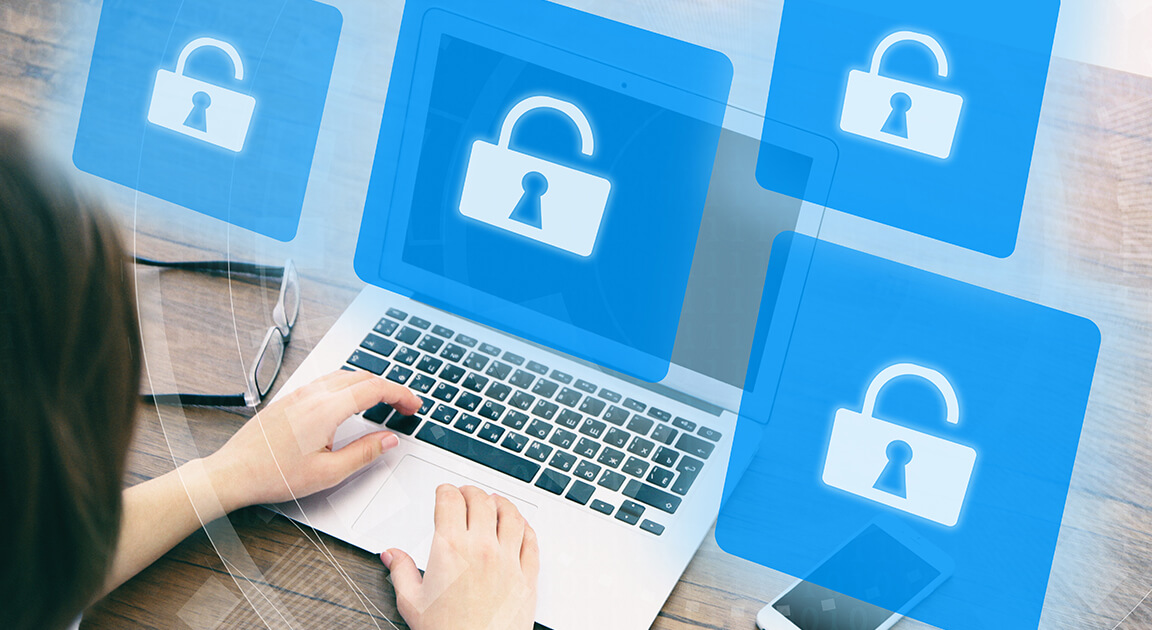
When businesses want to keep their data safe and secure no matter where it's located, they often use a virtual private network or VPN. Because of the rise in cyber attacks, Bring-Your-Own-Device (BYOD) programs and the necessity for enhanced data security, VPN demand is growing, with a projected industry growth rate of nearly eight percent in the U.S. market alone between 2019 and 2026. However, if you're trying to decide if your company should be using a VPN, it's important to understand the pros and cons of using one. Here are some important factors to consider:
What is a VPN?
A VPN is advanced technology that creates a secure internet connection for your devices via data encryption. It creates a safe way to access corporate data online over networks that are not encrypted or secure, such as free public Wi-Fi networks. VPNs work by creating a "secure tunnel" that can only be traversed by encrypted data. This tunnel "bores" its way to the receiving end by using tunneling protocols that encrypt the data you send and decrypts this information for the receiver. You can use several types of VPNs to enhance your data security, including traditional site-to-site VPNs using a WAN network, clientless SSL VPNs and other cloud-based VPNs.
How a VPN Helps Your Company
If you want to keep your information safe and secure from hackers and unauthorized users, then it's worth considering using a VPN. Businesses use VPNs to enhance the security of their networks and maintain privacy when employees, contractors, vendors and other important stakeholders who have access to their data and networks are traveling, working from home, or otherwise accessing their information remotely.
Benefits of Using a VPN
VPNs offer several benefits for businesses, including:
- Safe remote access. With employees traveling and working remotely, you can have workers or contractors accessing your proprietary information or your customers' private information from any Wi-Fi connection.
- Secure data sharing that's safe to use. You can enhance data sharing by opting for a VPN that encrypts the entire internet connection. This makes a secure connection so that your employees can share data safely, whether uploading or downloading files. You can also use a VPN to avoid censorship when traveling abroad and conducting business in other countries.
- Enhanced security. Relying on antivirus software programs and firewalls isn't enough to protect your data. New malware is created as often as every four seconds and research shows that antivirus software programs have a 45-percent cyberattack identification rate. VPNs help to provide an extra layer of security from hackers, malware and viruses.
- Easier management. VPNs make it easier to manage data access securely for Bring-Your-Own-Device (BYOD) programs. You can also easily grant and stop access to contractors who use your network and database from remote locations.
Drawbacks of VPN
While your business can take advantage of the many benefits VPNs bring, there are a few drawbacks to consider. With a traditional VPN, you can expect the setup and costs to be time-consuming and more expensive than cloud-based VPNs. That's because the more employees in your company that need VPN access, the larger the technology requirements. Also, it may take longer than expected to set up a conventional VPN if the VPN isn't compatible with your existing network, or you need an IT team to help set up the VPN.
Deciding whether or not getting a VPN makes sense for your business is a personal choice. But it's often a smart move to get a VPN to take advantage of its benefits, including enhanced security and safe remote access. Just compare the benefits and drawbacks of using a VPN for your business and consider your needs. By taking these measures, you can decide if getting a VPN is the right move for your company.

- Arranger, Analytical, Learner, Achiever, Input
Jim DeBoer
Jim DeBoer is a Service Manager at Lutz Tech. He began his career in 2005. Jim is responsible for overseeing the delivery of high-quality IT services to clients. In addition, he manages the Lutz Tech Service Desk team, which provides remote or on-site support, troubleshooting, installation, and maintenance for computer systems and equipment.
Recent News & Insights
Lutz Named Top Consulting Firm in 2025 Omaha B2B Awards
Direct vs. Indirect Costs in the Construction Industry
Unconscious Bias in Recruitment: How to Overcome It
Lutz adds Peterson and Wayman




%20(1)-Mar-08-2024-09-22-41-1011-PM.jpg?width=300&height=175&name=Untitled%20design%20(5)%20(1)-Mar-08-2024-09-22-41-1011-PM.jpg)
%20(1)-Mar-08-2024-09-27-14-7268-PM.jpg?width=300&height=175&name=Untitled%20design%20(6)%20(1)-Mar-08-2024-09-27-14-7268-PM.jpg)

%20(1)-Mar-08-2024-09-11-30-0067-PM.jpg?width=300&height=175&name=Untitled%20design%20(3)%20(1)-Mar-08-2024-09-11-30-0067-PM.jpg)
%20(1)-Mar-08-2024-09-18-53-4361-PM.jpg?width=300&height=175&name=Untitled%20design%20(4)%20(1)-Mar-08-2024-09-18-53-4361-PM.jpg)
-Mar-08-2024-09-03-21-1119-PM.jpg?width=300&height=175&name=Untitled%20design%20(1)-Mar-08-2024-09-03-21-1119-PM.jpg)
-2.png?width=264&height=160&name=Website%20Featured%20Content%20Images%20(1)-2.png)
-Mar-08-2024-08-50-35-9527-PM.png?width=300&height=175&name=Untitled%20design%20(1)-Mar-08-2024-08-50-35-9527-PM.png)


.jpg)




